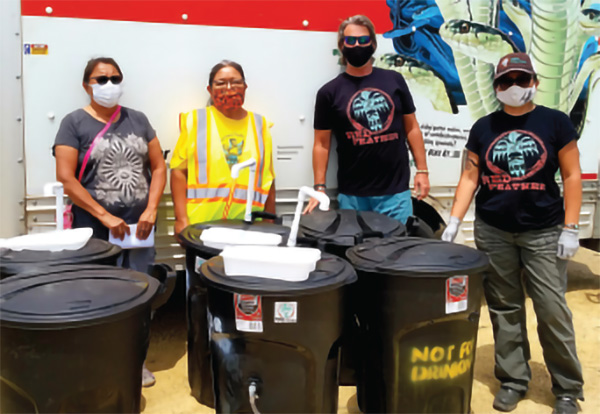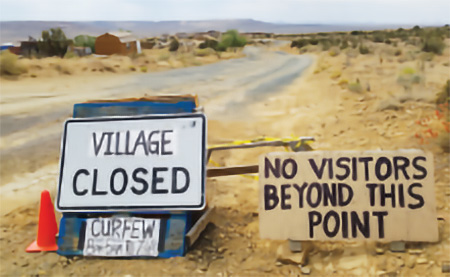
From left, Oraibi Village Board member Alice Joshevama,
Chairperson Beatrice Norton, Red Feather
volunteer M. Miles, and Red Feather Senior Program
Coordinator Shannon Maho. Photo by Morgan Craft.
By Morgan Craft
Flagstaff, Ariz. – The village of Oraibi sits on a dusty mesa high above the desert floor, two hours northeast of Flagstaff, the unofficial capital and historic heart of the Hopi nation. Occupied since 1150 AD, it is believed to be the oldest continually inhabited community in North America.
Today, entry to the remote village is blocked by a manned security post and signs admonishing potential visitors not to enter. COVID-19 has shut down both the Hopi and surrounding Navajo nations with a rate of infections higher than any state in the country.
Despite its significance in Hopi culture, Oraibi lacks access to running water even to this day. Residents must drive five miles to the nearest regulated source and haul it themselves, or rely on water trucked in by the tribe. Others acquire water from the thousands of unregulated wells across the region tainted by bacteria, the aftereffects of uranium mining and high levels of arsenic.
Adequate sanitation and access to clean water have proven to be two of the fundamental factors affecting the spread of the coronavirus, access which many homes on the Hopi and Navajo reservations do not have. One in three lack indoor plumbing. And with multiple generations often living under the same roof and sharing water resources, the situation is dire.
Enter the Red Feather Development Group, a Flagstaff, Ariz., nonprofit created in 1995 to address the quality of living across Indian country. Red Feather partners with the Hopi and Navajo nations to develop sustainable solutions to the housing needs within their communities, implementing programs that address home weatherization and repair, clean heating solutions, and healthy housing demonstration workshops.
With the spread and impact of COVID- 19 on the Hopi and Navajo nations, Red Feather has expanded its efforts to address and provide sanitary water solutions to families without running water in their homes.
“The luxury of being able to turn on a tap and instantly have access to running water is easily taken for granted,” said Red Feather Director Joe Seidenberg. “And in our frequent communication with our friends around the reservations during lockdown it became apparent that there was a specific and urgent need for sanitary washing. So we went to work to come up with a solution.”
Red Feather adopted a Do-It-Yourself handwashing design from LavaMae, a nonprofit based in California. The design affords up to 500 washes with one fill and is operated via a foot pump providing handsfree operation.
To date, the Red Feather staff and over 70 volunteers have assembled and distributed nearly 200 handwashing stations across the Hopi and Navajo nations.
“Our volunteers are essential to the success of all our programs,” said Shannon Maho, the senior program coordinator, who shares both Hopi and Navajo lineage.
On a hot and windy late-July afternoon, Maho and a pair of Red Feather volunteers delivered a shipment of two dozen finished washing units to the Hopi villages of Oraibi, Bacavi and Shungopavi, and provided instruction on their use. They were met at the Oraibi checkpoint by members of the village council, and the impact on community elders and residents was evident.
“Being the only Hopi village without running water, having to haul it, is a heavy task for our members,” said Beatrice Norton, the village’s chairperson. “Many of them have had to share the same water to clean. To have something like this device during this difficult time is really going to help our community with cleanliness and sanitation. It’s a great benefit to our people, now and going forward.”

Warning signs at the entry to Oraibi
Village. Photo by Morgan Craft.
Oraibi Village board member Derek Davis was present to unload and learn the operation of the washing systems, instructed by Red Feather’s Maho. “Filling and reusing water basins isn’t the cleanest way to sanitize, and these units offer a hands-free solution that will help our people stay healthy,” he said, “Now we hope to build these ourselves, for our people. For this we are grateful.” Each of the units cost Red Feather around $230 in materials alone. And while to date they have been able to raise around $50,000 from private donations and grants, the need for continued support is clear, with over 300 families on their waitlist. Red Feather has started training local community groups how to build the units themselves to help meet demand and strengthen local capacity. The work is ongoing, and necessary.
Morgan Craft is a volunteer with Red Feather Development Group. He lives in Sedona, Ariz.








